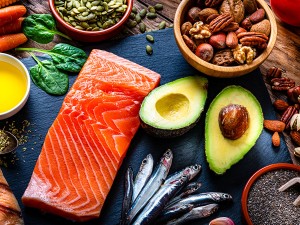The start of a new year is all about making changes for the better, and hopefully maintaining those changes for years to come. However, it seems that often so many people fall off the wagon and frustratingly never get around to making those changes, or put them off until the arrival of yet another new year. When your goal is to become healthier, perhaps making more nutritious choices for meals or to lose weight, you may be surprised just how much emotional and mental support a dietitian needs to provide.
To help make 2024 a year in which readers become smarter about nutrition, we asked three dietitians from Meadville Medical Center to provide some insight about setting goals and sticking with them to improve your health through nutrition:
- Carrie Powell Dinsmore, RDN, LDN, Director of WIC and Family Planning Services at Northwest Pennsylvania WIC
- Bethany Say, RD, LDN, CDCES, Diabetes Program Coordinator, Outpatient Dietitian, Mind-Body Wellness Center
- Stefanie Arblaster, RD, LDN, Outpatient Clinical Dietitian, Mind-Body Wellness Center
People seem to give up on New Year’s resolutions, or a goal to make a major improvement to themselves at any point in time, fairly quickly. How would dietitians advise someone to set him or herself up for success and not failure?
Carrie: To set up for success, you need to make changes in your diet that you can live with. There’s no sense in changing something short term, to only achieve short term success. You really need to make changes you can live with, and be mindful them of as life happens. Every culture involves food, traditions, and celebrations – we all need to live and enjoy life with moderation being the key.
Bethany: Consider starting with one or two changes about which you feel confident and with which you can consistently follow through. When you feel like those changes have become a part of your routine, then start thinking about your next steps.

With exercise, for example, walk for 10 minutes, 3 days per week to start, then add more days or more minutes when you feel comfortable to build up to a long term goal of 20 minutes a day, 4 days per week. For your nutritional goal, start by adding a fruit choice with breakfast and have a side salad with supper on weekdays.
Aside from starting small, think about the specific steps you’ll need to take to implement your goal and be successful. Using exercise and nutritional goals again as examples, if you want to start going to an aerobics class, you will need gym shoes, a water bottle, and a gym membership. If you want to start eating out less, you will want to think about planning meals at home and making a grocery list in advance.
Stefanie: I specifically tell people who have been battling the “yo-yo” diets their entire life, you have to unlearn all of the misinformation that you’ve heard about nutrition. I also always recommend looking at any lifestyle change as a habit rather than “this is something I’m doing for 6 months”, etc.
And exactly like the ladies said above, start with small changes. Try to be 1% better everyday and don’t expect yourself to be perfect. I think health changes are more so about what we do 85-90% of the time.
We have yet to see what will trend in 2024, among them, diets, specifically those “fad diets”. Do these ever work?
Carrie: Diet trends continue to change, but one thing remains consistent: each trend is just providing you lower caloric intake. Anytime you reduce calories in your diet, you enter a calorie deficit and you lose weight. In the past 30 years we’ve seen low-calorie, low-fat, low carb, and now intermittent fasting as some of these approaches. Unless these approaches are medically necessary, one thing will remain consistent: they are hard to follow long term.
Bethany: Diet trends tend to cut entire food groups out of someone’s daily choices, which can be exhausting both physically and mentally. Overall, trendy diets are typically too restrictive for anyone to stick with over time. They promise a quick solution, but not a lasting one. As they say: “slow and steady wins the race,” right? Some recent fad diets would include the cabbage diet, military diet, and paleo diet. To Carrie’s point, there are times when some of these diets are medically necessary and recommended by someone’s doctor to avoid major health complications.
Stefanie: Something I always tell my patients: if it’s too good to be true, it probably is! You can’t undo an unhealthy relationship with food by participating in fad diets that were designed to only work short-term. Another diet that has been quite popular recently is keto/low-carb . I agree 100% with everything noted by Carrie and Bethany, and would point out that unless it is medically necessary and discussed with your provider, there is no need to cut out an entire food group forever!
Are there any popular diets or eating recommendations that have some proven benefits and/or have stood the test of time?

Carrie: For years, the Mediterranean diet has been a go-to diet recommendation from dietitians. It offers plentiful amount of fruits and vegetables, whole grains, lean meats and omega-3 fatty acids like extra virgin olive oil and those from fatty fishes like salmon and tuna. This diet promotes heart health and is rich in antioxidants, which help protect against cancers, inflammation, and illness.
Bethany: I second the Mediterranean diet go-to! I believe an article just came out a week or two ago that it was voted the healthiest diet pattern again by healthcare professionals. Of course, we have to think about what aspects of this diet we can reasonably work into an individual’s day, which varies from person to person. Respectfully, our American food culture is drastically different from this eating style. I think it’s important that we take the Mediterranean guidelines and think of them as suggestions to use for the majority of choices, not something that you have to follow 100% of the time to be successful. Perhaps we start with just trying some new recipes for supper, for instance.
Stefanie: Agree with everything noted above! I always describe the Mediterranean diet as more of a “pattern of eating” versus a “diet”. I think people respond to this better and it is less daunting. It can truly be as simple as swapping butter for olive oil and incorporating fish twice a week.
If most diets (perhaps with the exception of the Mediterranean diet) are ultimately too restrictive for long-term results, yet calorie restriction is needed for weight loss, a very common New Year’s goal, why doesn’t calorie restriction alone work?
Carrie: Calorie restrictions are tricky. On one hand, you need to reduce calories to lose weight; and on the other hand, if you reduce too low, or for too long, your body tries to save what’s left. Your metabolism can really slow down and your rate of weight loss will lessen. Most people do not have success on low calorie diets because they are not enjoyable or maintainable. Once you resume some level of normal eating pattern, your body relaxes and weight gain returns.

Bethany: Calorie restriction can be challenging mentally simply due to focusing on the restriction, or focusing on what you cannot have. For those who are medically recommended for a lower calorie diet, I encourage them to focus on including lower calorie foods they enjoy daily, such as whole fruits, vegetables, dairy products, lean meats, whole grains, and moderate amounts of healthy fats. We also typically discuss focusing on beverages that do not contain calories. Through these methods, we can increase our volume of food while actually decreasing calorie intake. This helps with the increase in appetite that typically comes following weight loss, as the body attempts to return to its baseline weight.
Stefanie: Calorie restrictions CAN work, however, as noted above, restricting calories too drastically can tank our metabolism. Restricting calories too drastically can also have some other negative effects rather than just metabolic. It may cause decreased gastric motility, low body temperature, decreased energy levels, and more.
Metabolism is another keyword used often in dieting, weight loss, and nutrition! What can you clarify for those who are trying to eat healthier and maintain or lose weight, but aren’t sure of how their metabolism is affected?
Carrie: Sometimes medical conditions can affect weight and metabolism. However, for most people, increasing exercise, eating smaller and more frequent meals, and drinking plenty of water can boost metabolism. Your muscle mass, body composition, age, sex, and activity greatly affect metabolism. Increasing exercise, reducing portions, and keeping small meals and snacks as part of your strategy throughout the day are great approaches to increasing metabolism.
Bethany: Most people have a “Goldilocks zone” for their energy intake. If you consistently eat too little, your metabolism will respond by going into an energy saving mode (like when your cell phone goes to low battery mode). If you consistently eat too much, your body will store the extra as fat to be used for energy later in case of a famine.

A common challenge I see with clients is a generally very low intake of food, paired with an excess of sugar intake via soda, iced tea, energy drinks, etc. These individuals tend to have the hardest time with weight management and energy levels throughout the day. I encourage my clients to be mindful of their hunger cues to know when to eat, then focus on eating enjoyable quality foods that support their needs, and stopping at a fullness level of 7 out of 10. These strategies are a part of intuitive and mindful eating practices that support mental and physical health.
Stefanie: I have many patients who are shocked when I give them any sort of calorie recommendation above 1,200 calories per day. This is mostly due to what they would hear and/or see on social media or fitness apps. There are so many factors that affect one’s metabolic rate and how many calories you will need to either gain or lose weight. Our bodies naturally do everything in their power to maintain in a state of homeostasis, so when we make drastic changes, our body compensates and adjusts for that. It’s important that you get calorie recommendations from a qualified health professional to help ensure you are either losing or gaining weight at a healthy rate.
One more thing on the topic of fads and things that are too good to be true — what’s your take on the popularity of weight-loss drugs like Wegovy and Ozempic?
Carrie: These are not my area of expertise, but there seems to be very little long-term evidence surrounding weight-loss drug trends (like Wegovy and Ozempic ). My personal feeling is, yes, if it seems too good to be true, it probably is!

Bethany: I do see a lot of patients utilizing these drugs as a method of weight loss. In my experience, the majority of patients using this tool feel it is a helpful adjunct therapy while working on other lifestyle changes. Individual results vary, of course. The most common complaint from patients is that they have varying degrees of GI side effects (i.e. nausea, vomiting, loose stools). In most cases, they choose to stay on the medication and we work on nutrition changes that can decrease these side effects, such as eating smaller and more frequent meals. At this time, the expectation for patients is to be on these medications long term, with their doctors monitoring their weight progress and dosage over time.
Stefanie: I agree with Bethany’s experience and expertise on this one! I also always tell people that these medications are beneficial as a tool in weight loss, but there still needs to be some degree of dietary modification and lifestyle change.
The three of you agree about nearly everything here! If readers can take everything here and apply it to their lives, how should they accomplish the first and sometimes hardest step: setting their goals?

Carrie: A common pitfall with people (and especially around new years and resolutions) is trying to change everything at once. It normally takes 90 days to break a habit. So finding one or two things to change at time is key. SMART goal setting is “smart approach” as it allows you to make a “specific, measurable, attainable, relevant, and time-bound.” goal. I can change this one thing, in this amount, between now and this future date”. Over time, SMART goals can help you gain success, and sustainable change. You can build on SMART goals, or start new SMART goals as you make progress. Trust the process.
Bethany: A common pitfall is for someone to get very excited about changing their lifestyle and then make a list ten items long of all of the things they want to change starting January 1st. These folks tend to start off strong, then get overwhelmed and burn out. Then they feel defeated and quit all of their goals. This can start a cycle of fad dieting and weight yo-yoing, which is detrimental for one’s metabolism over time. A good metaphor would be looking at lifestyle changes as a very long hike in the woods as opposed to a sprint on a racetrack. A long hike requires that you pace yourself and be patient, taking small steps to keep moving forward.
Stefanie: Setting small and sustainable goals are incredibly helpful for weight loss. Piggybacking off what Bethany said, I always encourage people to think of changing health and diet as an overall lifestyle change rather than something you do for 6 months or even shorter. I always focus on 2-3 small changes someone can make and go from there. Trying to change your diet and lifestyle all at once is incredibly overwhelming and overall not successful in terms of health outcomes. It just causes people to become disappointed in themselves and lead to a cycle of shame and decreased self-confidence, which ultimately affects our nutrition and eating habits (example: shame and low self-confidence can result in increased emotional eating).
Thank you, ladies, for your input on making smarter nutritional decisions in 2024! Hopefully each individual who reads this can learn to make some sound decisions based on his/her/their individual needs or work with a primary care provider or registered dietitian to determine the best options. For all the ways in which we believe what to or what not to eat matters most, we need to step back and focus on how we make decisions, set goals, and how the positive or negative outcomes affect our motivation and choices for the next steps!
Key Takeaways
- Start with smaller goals you can achieve, and don’t beat yourself up if at first you don’t succeed!
- Become aware of your hunger cues to identify when you are truly hungry and need to eat, and when you are full and no longer need to consume food at a meal or snack.
- There are fundamentals of nutrition, like eating fruits and vegetables and consuming less sugar that would benefit nearly everyone. If you are going to add or eliminate certain foods from your diet, you still need to find ones you enjoy that you can consume, otherwise your changes will never have beneficial results!
- If it sounds too good to be true, like a cure-all diet or drug, it probably is! There are times when weight-loss drugs and restrictive diets may be necessary, but should be done under the guidance of a medical professional, like a physician or registered dietitian.
- Think about incorporating healthier options into not only what you eat but what you drink! Sugary drinks contain a lot of calories about which we sometimes forget!
- Familiarize yourself with SMART goals, and remember that consistent steps and planning ahead will help to build long-term healthier habits rather than a cycle of short-term successes and disappointments.
- Never stop learning new things! The recipes and readings below that were suggested by our dietitians are a great place to start!
Recipes and Readings
EatRight.org
EatRight.org is the official website of Academy of Nutrition and Dietetics and has a great recipe selection often referenced by MMC’s dietitians! Some articles of insight include:
Additional Recipe Resources
Weight loss recipes from the Mayo Clinic
Eat Right’s 20 Mediterranean Winter Recipes
Some suggested starters from Mediterranean Winter Recipes:
- Vegan lentil stew
- Sheet pan balsamic parmesan chicken and vegetables
- Chicken parmesan quinoa-stuffed peppers
- Pesto shrimp
American Heart Association recipes, which includes vegetarian options, slow cooker recipes, and international-inspired choices!


